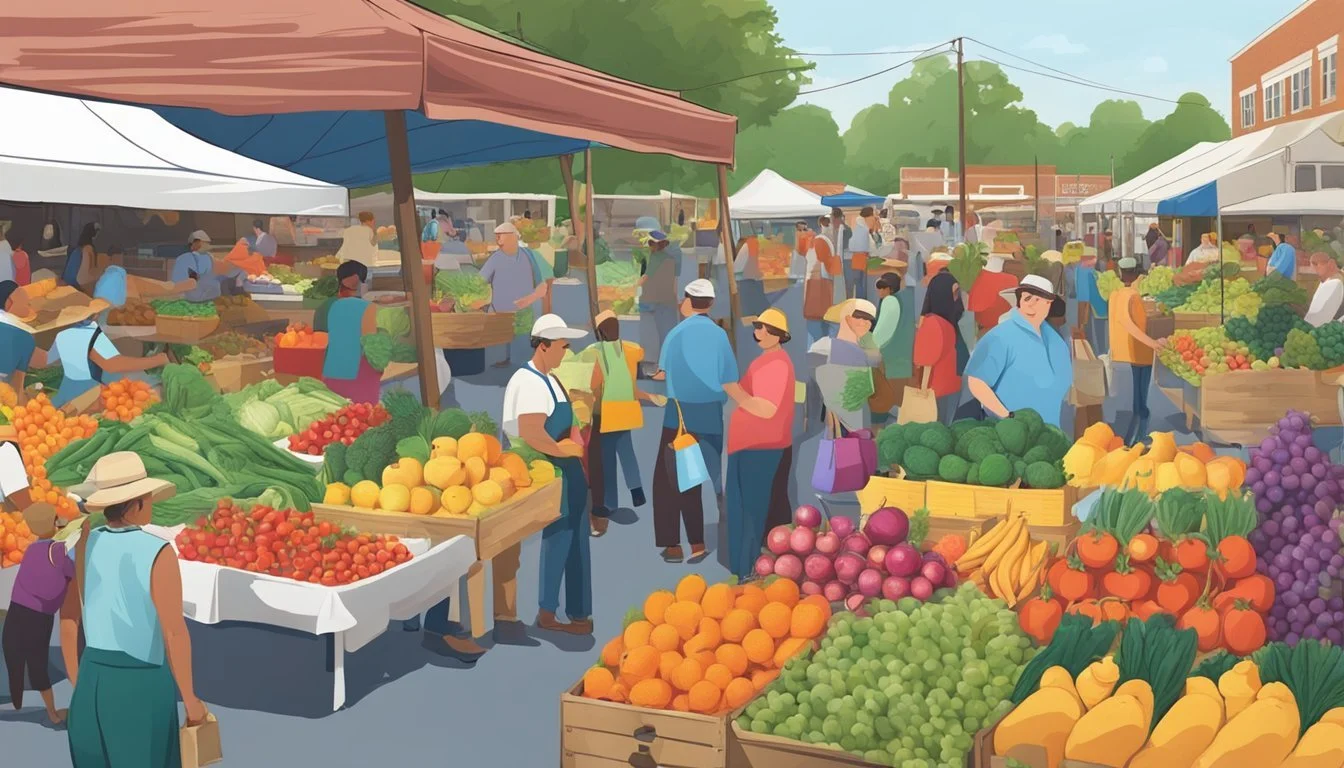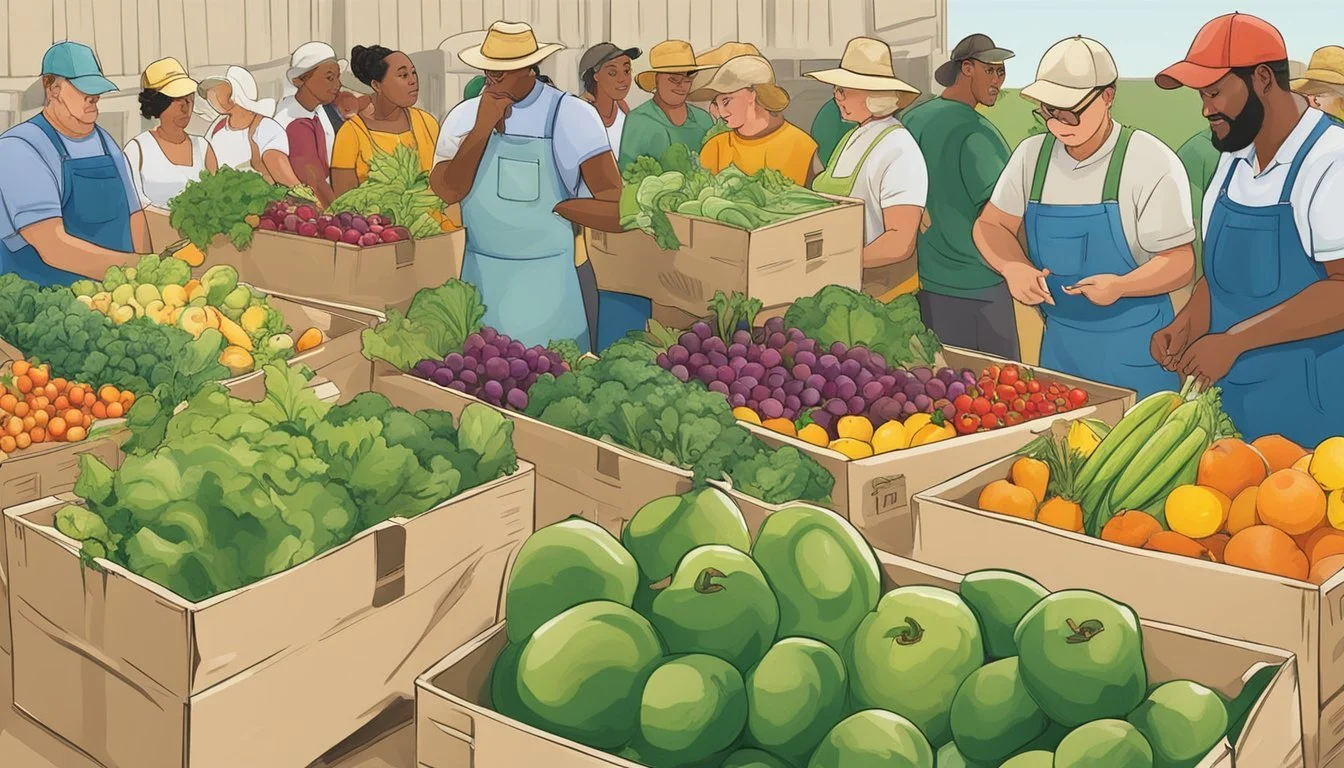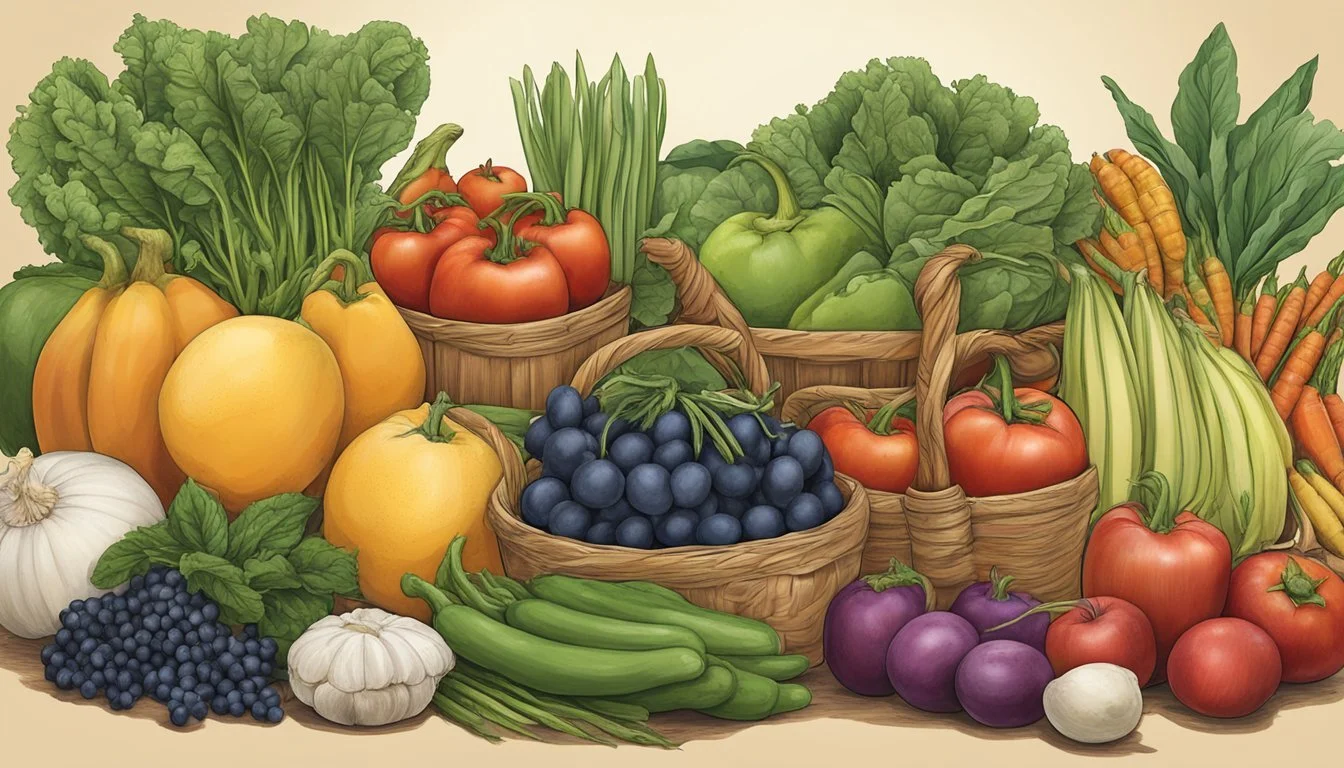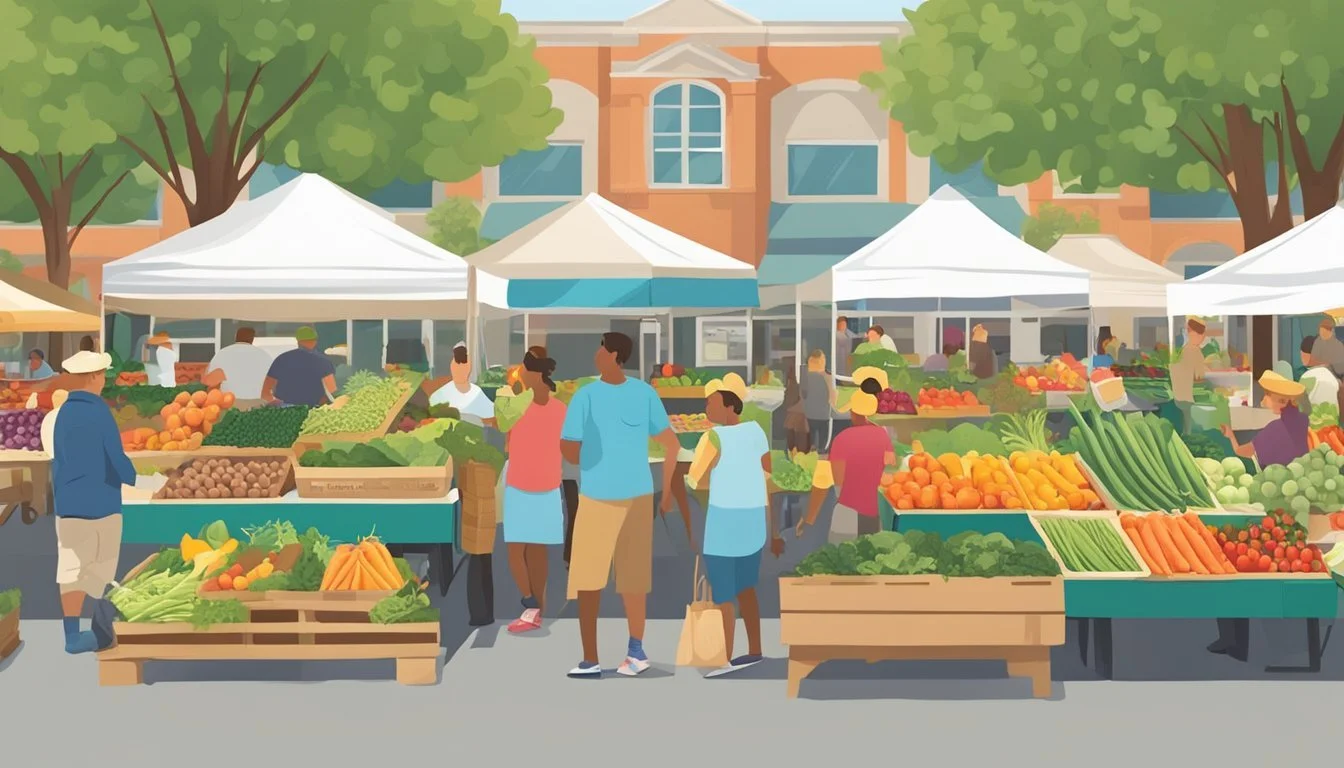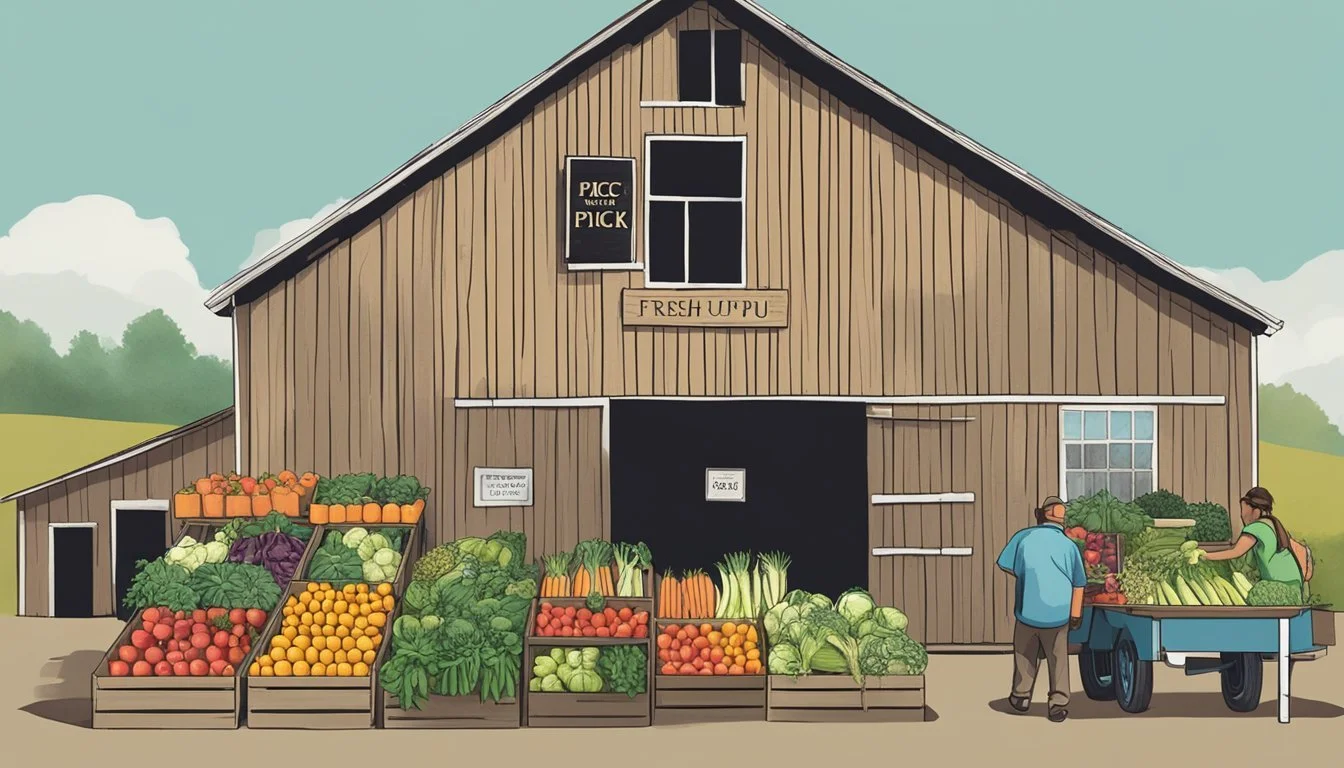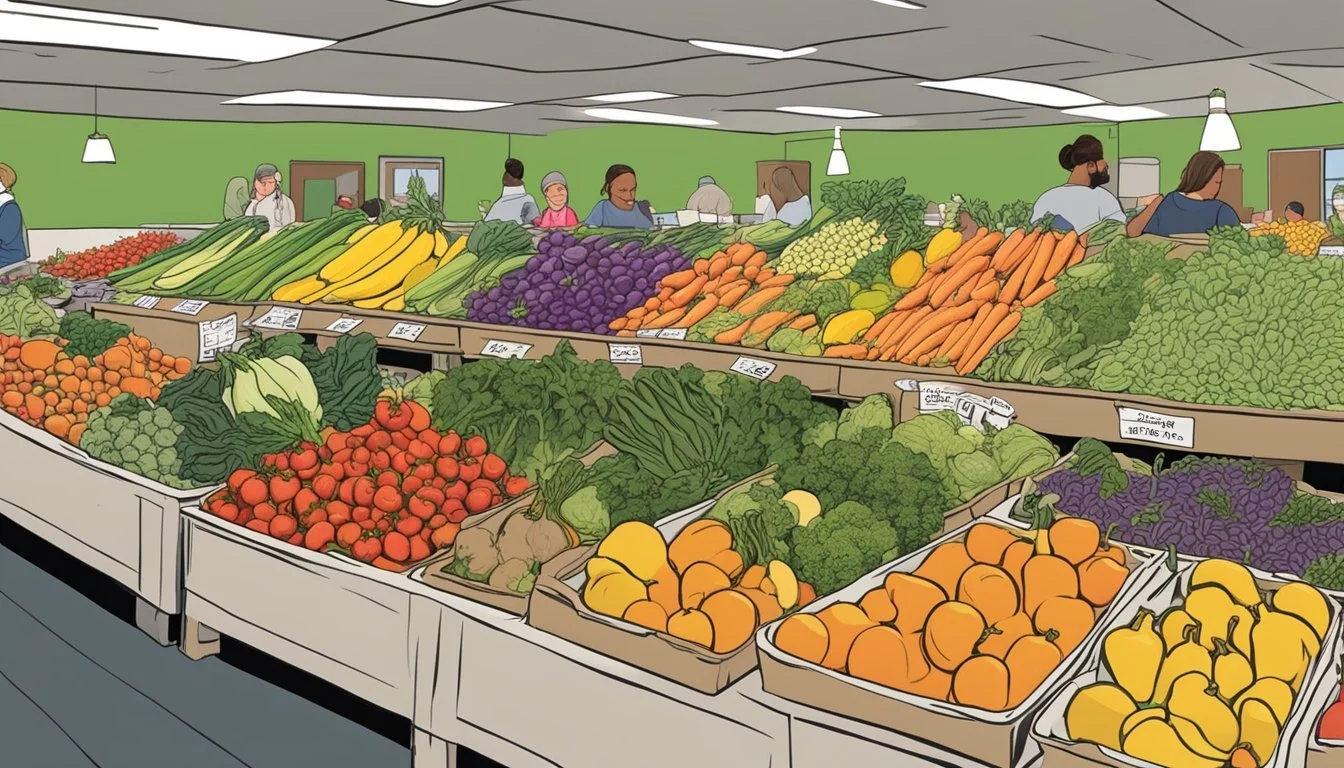Community Supported Agriculture (CSA) in Lakewood, NJ
A Guide to Local Farm Partnerships
Community Supported Agriculture, commonly known as CSA, has become a pivotal aspect of the local food movement in places like Lakewood, NJ. This model of agriculture encourages relationships between consumers and farmers, allowing consumers to subscribe to the harvest of a certain farm or group of farms. Through CSAs, Lakewood residents have the opportunity to invest in local farms at the beginning of the growing season, which in turn provides them with regular shares of freshly harvested produce and other farm products.
In Lakewood and the surrounding areas, CSAs are notable for their contribution to both food security and sustainability. By participating in a CSA, community members directly support local agriculture, helping to ensure that farmers can continue their trade in the challenging economic landscape of modern farming. They receive an abundance of fresh, typically organic, fruits, vegetables, herbs, and sometimes additional farm products like honey or eggs, depending on the specific offerings of the CSA.
The concept of CSA in New Jersey emphasizes fresh, high-quality produce provided to shareholders throughout the harvest season. Farms like Honey Brook Organic Farm have been instrumental in setting high standards for CSA produce in the Garden State. With various options ranging from bi-weekly to full-season shares, Lakewood residents can choose a level of participation that fits their household needs, making CSA a flexible and integral part of their culinary routine.
Understanding CSA
Community Supported Agriculture, commonly known as CSA, represents a model that fosters a partnership between farmers and consumers. This section provides insight into the CSA concept, how it benefits both consumers and farmers, and its historical context in Lakewood, NJ.
CSA Concept and History
CSA involves individuals purchasing shares of a farm's harvest in advance. These shares, often called subscriptions, allow consumers to receive a portion of the season's produce. The history of CSA traces back to the 1980s, where it emerged as a response to support local agriculture and build community relationships.
Benefits of CSA for Consumers
Consumers benefit from CSAs by:
Gaining access to fresh, seasonal, locally-grown produce.
Developing a closer connection with the source of their food.
By participating in a CSA program, consumers help create a stable market for local farmers, ensuring a reliable supply of fresh produce for themselves.
Benefits of CSA for Farmers
CSA programs offer farmers several advantages:
Financial sustainability: Early-season subscriptions provide capital to cover initial operational costs.
Market assurance: A committed customer base means less uncertainty over produce sales throughout the season.
Farmers are encouraged to maintain a symbiotic relationship with their subscribers, fostering community support and investment in sustainable agriculture practices.
How CSA Works in Lakewood, NJ
Community Supported Agriculture in Lakewood, NJ connects residents with local farms through a model that supports sustainable agriculture and community health. This section outlines the farm profiles, share structures, payment methods, and seasonal offerings inherent to the region's CSA programs.
Local CSA Farm Profiles
Lakewood is serviced by several notable CSA farms, such as Honey Brook Organic Farm, which prides itself on being one of the oldest and largest certified organic farms in New Jersey. Other prominent CSA providers include Genesis Farm, Fernbrook Farms, and Dreyer Farms, each offering its unique variety of fresh produce. Ort Farms and Earthen Harvest further contribute to the area's diverse CSA options, solidifying Lakewood's status as a hub for fresh, locally-sourced food.
CSA Share Structures
CSA shares in Lakewood typically fall under two main categories: full shares and bi-weekly shares. A full share, designed to meet the vegetable and fruit needs of a family, could range from $600-650. Alternatively, smaller households might opt for a bi-weekly CSA Share costing between $350-400, providing them with a more manageable quantity of fresh produce.
Membership and Payment Options
To join a CSA in Lakewood, members may pay an upfront one-time fee or choose a series of installments. Payment not only secures a seasonal supply of fresh, farm-to-table vegetables and fruits but also aids farmers with necessary early-season operating cash. Many farms accept various forms of payment, including credit card transactions and online payments, to facilitate convenience for members.
Seasonal Availability
Lakewood CSA members enjoy a bounty of produce according to the local growing seasons. Spring and summer mark the period for planting and harvesting a multitude of fresh vegetables and fruit. CSA farms operate chiefly within these seasons, ensuring that members receive the freshest produce picked at peak ripeness for flavor and nutrition. Certified organic options are available for those seeking environmentally sustainable and pesticide-free choices.
Organic and Sustainable Practices
Community Supported Agriculture (CSA) in Lakewood, NJ offers a robust selection of organic produce, underpinned by certified agricultural practices that prioritize sustainability and environmental health.
Certification and Standards
Certified organic farms around Lakewood, NJ, such as Honey Brook Organic Farm, adhere to stringent guidelines to earn their certification. These standards prohibit the use of synthetic pesticides and herbicides, ensuring that the fresh produce—from organic vegetables to organic fruits—is grown using natural methods.
Key aspects of certified organic farming include:
Use of natural pest control methods
Soil fertility maintained through natural processes
Absence of genetically modified organisms (GMOs)
Environmental Benefits
The ecological footprint of agriculture is significantly reduced through sustainable practices employed by local CSAs. These practices not only yield high-quality, organic produce but also foster biodiversity and soil health, offering long-term benefits to the environment.
Benefits of sustainable farming include:
Enhanced soil conservation
Improved water quality and usage
Decreased pollution from agricultural inputs
By committing to these organic and sustainable methods, Lakewood's CSA farms contribute to a healthier ecosystem while providing the community with nutritious, flavorful produce.
CSA Products and Varieties
In Lakewood, NJ, Community Supported Agriculture programs offer a diverse array of farm-fresh products, ranging from traditional vegetables to unique items like local honey and artisanal cheese.
Types of Produce Offered
Vegetables: CSA members can expect a variety of vegetables that change with the season. Common offerings include:
Leafy greens such as lettuce and kale
Root vegetables like carrots and potatoes
Summer favorites, for instance, tomatoes and cucumbers
Winter staples, including squash and onions
Fruit: A selection of local fruit is often available, with options such as:
Apples
Peaches
Berries
Herbs and Flowers: Fresh herbs and edible flowers are also part of many shares, providing flavors and garnishes for meals.
Beyond Vegetables: Additional Offerings
Eggs and Cheese: Local, free-range eggs and handcrafted cheeses are also offered by some CSAs. These proteins are fresh and are a testament to the sustainability of the farm.
Meat: For those interested in local meats, certain CSAs include poultry, beef, or pork sourced from animals raised on pasture.
Honey: Raw honey, prized for its natural sweetness and potential health benefits, may be included as well.
Understanding Share Sizes
The size of a CSA share varies, catering to different household needs. Typically, they are itemized as:
Bi-weekly CSA Share: Suitable for small households or those new to CSAs.
Full CSA Share: Best for larger families or avid vegetable consumers.
Members can select the share size that best fits their consumption patterns, ensuring they receive the right amount of fresh produce regularly.
Community Engagement and Education
Community Supported Agriculture in Lakewood, NJ extends beyond the provision of fresh produce to its members; it cultivates a strong bond between the community and local agriculture through engaging events and educational initiatives.
Farm Events and U-Pick Opportunities
CSA farms in Lakewood provide the community with various farm events where members can directly engage in agricultural activities through U-Pick opportunities. These events often correspond with the harvest calendar, allowing participants to pick their own Jersey Fresh produce. For example:
Strawberry Picking: Typically in June, perfect for families.
Apple Harvesting: Often in September, aligns with local festivals.
U-Pick events not only connect the community with the farming process but also provide an immersive experience that encourages an appreciation of local agriculture.
Educational Programs and Workshops
Local CSA farms offer a range of educational programs and workshops tailored to both children and adults. They cover sustainable farming techniques, the importance of local food systems, and practical skills like canning or cooking with seasonal ingredients. Some notable offerings include:
Youth Gardening Clubs: Engage children in growing food.
Composting Workshops: Educate members on reducing food waste.
The workshops aim to empower individuals with knowledge on sustainability and food production, while also underpinning the economic and health benefits of supporting local CSA farms and farmers markets.
Local Impact of CSA
Community Supported Agriculture in Lakewood, New Jersey, reinforces the local economy and fosters strong farmer-consumer relationships. These subsections explore each of these vital aspects in detail.
Supporting Local Economy
Community Supported Agriculture (CSA) programs in the Garden State, particularly in areas such as Lakewood, NJ, play a pivotal role in the local economy. By investing in CSA shares, community members directly fund local farmers, ensuring that their dollars circulate within the region. This model aids in sustaining New Jersey's agricultural heritage by financially backing local farms. Jersey Fresh produce not only bolsters the local food market but also reduces transportation costs and food miles, contributing to a lower carbon footprint.
Direct Economic Impact: Members' upfront payments provide farmers with necessary early-season cash flow.
Employment Opportunities: Vibrant local farms create jobs and support food processing and distribution networks.
Farmer-Consumer Relationship
In Lakewood's CSAs, the farmer-consumer relationship is paramount. Consumers aren't just purchasing produce; they're engaging with the very people who grow their food. This connection goes beyond a basic transaction, embodying the "know your farmer" ethos that is at the heart of CSA. The bond between local farmers and community members strengthens trust and reassures consumers about the quality and origin of their food.
Communication Channels: Regular updates from farmers keep shareholders informed about growing practices and crop progress.
Community Engagement: Events like farm visits and harvest festivals cultivate a sense of involvement and partnership.
Incorporating CSA into the fabric of Lakewood's food system reinforces the local supply chain and encourages a transparent, rewarding exchange between the growers and buyers of New Jersey's bounty.
Choosing the Right CSA for You
Community Supported Agriculture (CSA) offers individuals and families in Lakewood, NJ, the opportunity to support local farmers while receiving fresh, seasonal produce throughout the farming season. When selecting a CSA, it is essential to find one that aligns with your needs and contributes positively to your community.
Factors to Consider
When contemplating joining a CSA, individuals should consider several key factors to ensure they choose a program that best fits their lifestyle. Membership in a CSA entails a spectrum of aspects including the type of shares offered, the cost/payment structure, the variety of produce provided, and the pick-up location or delivery options.
Type of Shares: CSAs typically offer a diverse range of share options. Shares may be categorized by size, suitable for single individuals or larger families, and might also differ in the mix of farm products included.
Cost/Payment Options: It is important to review the payment structure of the CSA. Some require payment upfront, helping farms with early season capital, while others offer flexible payment plans.
Variety and Freshness: Potential members should inquire about the variety of produce expected in CSA shares and prioritize programs that champion fresh, seasonal selections.
Local Harvest and Support: Joining a CSA directly supports local farms, fostering a resilient local food system. Consumers are encouraged to find CSAs with strong connections to the farming community in Lakewood, NJ.
How to Find CSAs in Lakewood, NJ
Discovering the right CSA in Lakewood, NJ, requires some research:
LocalHarvest Website: A reliable resource is the LocalHarvest online directory, where residents can search for nearby CSA programs by entering the Lakewood area's zip code.
Farmers Markets: Visiting local farmers markets is a proactive approach. Here, individuals can meet farmers directly, inquire about their CSA shares, and sometimes sign up on the spot.
Community Boards and Social Media: Community centers, local businesses, and social media groups focused on Lakewood may have information on available CSA options and can often provide recommendations based on member experiences.
By meticulously considering these elements and utilizing resources such as LocalHarvest, Lakewood residents can find a CSA that aligns with their dietary preferences, supports local agriculture, and fits into their budget and lifestyle.
Practical Tips for CSA Members
Joining a Community Supported Agriculture program in Lakewood, NJ allows individuals to enjoy fresh farm products while supporting local farmers. Members should focus on maximizing the value of their shares and ensuring proper handling and storage of their weekly boxes.
Making the Most of Your Share
When receiving a weekly box, members should actively plan their meals based on the contents, which typically include a variety of fruits and vegetables. This helps in reducing food waste and encourages a diverse diet. It's useful to know how to preserve or can surplus produce, particularly during peak harvest seasons.
Personal Share Diversity: Embrace a variety of farm products; use unfamiliar items as an opportunity to try new recipes.
Recipe Ready: Have a collection of recipes that can adapt to different types of produce available in your share.
Share Pick-Up and Storage Tips
Pick-Up: Coordinate your schedule with the CSA pick-up times. If you cannot make it, arrange for a friend or family member to collect your share to avoid missing out on the freshest produce.
Storage:
Fruits: Store ripe fruit in the refrigerator, and keep unripe fruit at room temperature until it ripens.
Vegetables: Most should be kept in a humidity-controlled drawer in the refrigerator. Leafy greens do best when rinsed and stored in a sealed container with a damp cloth.
By being thoughtful about meal planning and proper storage, CSA members can fully enjoy the benefits of their shares from the local farmers market or direct farm pick-ups.
CSA and the Future
In Lakewood, NJ, Community Supported Agriculture (CSA) is poised for growth, reflecting broader trends toward sustainable agricultural practices and potential expansion opportunities within the Garden State’s farming landscape.
Trends in Agricultural Practices
The trajectory of agricultural practices is shifting as more farmers adopt sustainable and organic farming methods in response to consumer demands. Trends indicate an increasing number of CSA programs adopting these practices to ensure a supply of healthy, local food and to maintain soil fertility. Lakewood's farming community is no exception, with a steady rise in farms utilizing crop rotation, composting, and reduced chemical inputs to improve long-term land viability.
Key Sustainable Practices:
Crop rotation
Composting
Reduced use of synthetic fertilizers and pesticides
Integration of livestock for natural soil enrichment
The impact is twofold: it supports the environment and aligns with consumer values, building a stronger foundation for the future of CSA in Lakewood and beyond.
Potential for Expansion in New Jersey
New Jersey, often referred to as the Garden State, has a rich agricultural heritage with a significant potential for CSA expansion. Factors conducive to growth include:
High consumer interest: Proximity to urban centers drives demand for fresh, locally-sourced produce.
Land availability: Initiatives to preserve farmland and support younger farmers can facilitate new CSA enterprises.
State support: New Jersey's support for agriculture through grants and educational programs underscores a commitment to fostering sustainable growth in the sector.
Expansion Factor Relevance to CSA Growth in NJ Consumer demand for local, organic food High State programs for farmland preservation Positive influence on land availability Support for new farmer initiatives Encourages new CSA startups
Through the cultivation of these factors, Lakewood's CSAs could serve as a model for how agriculture might thrive sustainably, where both the land and communities benefit. The future of CSA in New Jersey looks promising, with potential for significant growth both in scale and impact.

